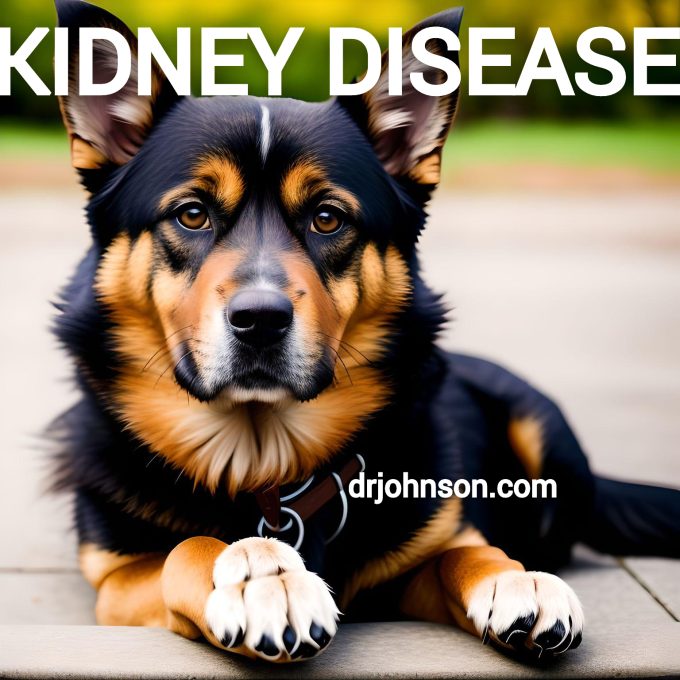Kidney Disease in Small Animals:
Consumer of this article is my Clients.
This is variably applicable to cats, and dogs. For example, Lepto is usually but not always a dog problem. Uroliths are more of a cat problem. So the article is about “sum and substance” and not specific to a species or condition. This article is dedicated to Algodon.
So, you’re looking at these details if your pet was diagnosed with:
- An elevated BUN
- An elevated Creatinine
- Electrolyte disturbances like a high Phosphorus
And may also have:
- Loss of appetite
- Unexplained weight loss
- Vomiting or stool changes
- Dehydration
Is this kidney failure? Or kidney impairment?
This matters. Sometimes the kidneys have ‘checked out’ and have no intention of bouncing back. Renal tissue doesn’t really regenerate. So, you have all the kidney-function you’re gonna get when you’re young. So it matters if the kidneys have FAILED or if they are only IMPAIRED. Separating whether the kidneys have FAILED or are impaired can be determined by:
Ultrasound, Xrays, tests of filtration rate, MRI/CT, double contrast cystourethrography, Lepto testing, kidney biopsy.
ALL of which absolutely will be done by franchise vets on 15% commission, and you know WHY.
But sometimes, there’s just experience to help sort it out. Sometimes it’s ‘almost-as-good’ to stir in the concepts of:
- (Im)possible exposure to Lepto (Right? Is it even practical to consider for the pet to have been exposed to Lepto?)
- Extreme age (Despite the above, I immediately think of Lepto in sub-geriatric patients with elevated BUN/Creat) but in dogs over 11 years of age, geriatric kidney impairment is more likely than not.
- Other clinical signs
- Onset of symptoms
- Other bloodwork results
If the dog is seventeen years old, it could be argued that the kidneys are just worn out. If the dog is seven years old, you look much harder for better reasons for young-dog kidney failure. Like genetics, Leptospirosis, infection, stones. But really? When it’s an older dog, you’re weighing things like kidney impairment from old-age, or cancer, against all of the above. And a lot of things that happen to elderly-dog-kidneys aren’t “that treatable” so what really helps??
So, sometimes a case really boils down to two simple things:
- Is the supposed kidney disease actually treatable?
- Is it NOT treatable? For example kidney-cancer is NOT treatable. Even with nephrectomy and chemotherapy the survival rates are pretty terrible and IMHO not worth ten-thousand dollars at a Specialty Boutique.
Because you can spend thousands and thousands on a diagnosis without determining ANYTHING about treatments. Sometimes they find cancer in the kidney, and then they want you to spend another thousand to biopsy the kidney to figure out the kind of cancer (why even?) AND another test to see how much that cancer has wrecked the kidney. Does ANY of that information make ANY difference to whether you are going to provide palliative support and comfort in a terminal patient?
Not unless you want to pay for a nephrectomy and advanced chemotherapy. And put an ADDITIONAL seven-thousand-dollars on the table. For six months. Maybe.
For two thousand dollars, an ultrasound and a biopsy and a GFR test – they can tell you in advance if it’s “end-stage kidney failure” – untreatable. Or, instead, you could spend $200 and find out it’s untreatable because it resists treatment.
So what am I saying?
If the case is treatable, let’s treat it. And if it’s UNtreatable do we want to go down that diagnostic rabbit hole?
For example: IF the pet has cancer in the renal system (kidney mainly) these therapies won’t help much. You can spend three thousand dollars to know it’s not treatable. Or you can spend three hundred on aggressive treatment and if it’s not treatable – then you know. For 90% off franchise prices.
If the case is treatable, let’s treat it.
Treatments include:
Fluid therapy for at least three days, aggressively. Preferably at least 5 days. And if the kidney values improve significantly, the owner can be encouraged that maybe the pet is going to be okay for a while ON FLUIDS in some form or fashion.
Specialized diets like Hill’s K/D (while reported by “The Cool Kids*” recently NOT to make any difference despite improved clinical performance and the reduction of kidney values), actually WILL extend life and reduce ammonia by-products of the type which cause kidney cases to deteriorate. In other words, KD works and will be recommended.
Alkalinizing the water, increasing water throughput at home with a steroid plus or minus ice. Adding water soluble vitamins which may be lost by a failing kidney, appetite stimulants. Other ancillary treatments that help.
Epakitin is a proprietary mixture of chitosan and calcium carbonate which reduces the phosphate levels in the bloodstream, making cats and dogs feel better. It’s no cure. But practically everyone who uses it with renal impairment cases reports a pet feeling better. https://amzn.to/3SpsR2t
What does it mean?
Some kidneys are still working, even if only a little bit. And if they are, they will improve with some supportive care, namely FLUIDS and SPECIAL FOOD.
Some kidneys are NOT still working and they will NOT respond to FLUIDS and SPECIAL FOOD.
In 3 to 5 days you will KNOW THIS without spending seven thousand dollars.
SO we would recommend fluid therapy for 3 to 5 days and evaluate the response of the kidney. Does it “step up?”
-
If the creatinine comes down significantly, then FURTHER MANAGEMENT is encouraged.
-
If the figures are NOT materially improved, then you should re-assess the approach.
What does ‘Further Management” look like?
Well most of the “kidney cases” end up staying on the special diets (there are like, five types and formats)
- Fluids periodically either symptoms-driven or scheduled
- Fluids can sometimes be given at home by a competent owner
- Supportive care
Dogs and cats are sometimes very cranky about fluids. This means the Vet has to do it, IF IT GETS DONE AT ALL.
Sedation or restraint, muzzles, cat-bags – may help but if the therapies are CATACLYSMIC in the minds of the pets, is it WORTH IT to “Quality of Life?”
Those are realistic questions.
In franchise medicine I don’t think euthanasia is a common suggestion because the commissions stop after euthanasia. They really do. But sometimes, it’s the best thing for an animal if you know the statistics and actually share those with an owner who’s watching the pet anxiously suffer and writhe on the end of a needle all the time.
“Does kidney failure hurt?”
No, not according to people suffering with it. They say that it feels like a flu. A loss of appetite and emerging nausea with a total loss of energy. My customer with kidney failure has been okay for years because of DIALYSIS, and she can tell when to schedule that based on how she feels. She is the one who told me that kidney failure doesn’t ‘hurt’.
Epogen / Erythropoeitin injections will someday be needed in all kidney cases. That can be dealt with when the need arises. I will author a document about it shortly.






